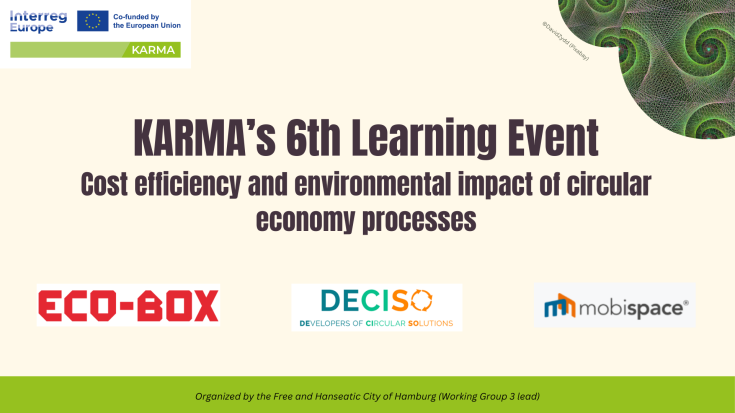KARMA's 6th online learning event (WG3)
On February 27th, 2025, the Free and Hanseatic City of Hamburg (DE), the lead partner in the KARMA project, hosted the second online workshop organized by Working Group 3: "Cost Efficiency and Environmental Impact of Circular Economy Processes." This event brought together experts, researchers, and key stakeholders to explore how circular economy principles can be integrated into construction while balancing environmental sustainability with economic feasibility.
With the increasing importance of sustainability in urban development, the event provided a platform for discussing the practical implications of circular practices, focusing on minimizing environmental impacts and ensuring cost-effective solutions for construction projects.
The online event featured three key presentations that shed light on different aspects of sustainable construction and circular economy processes:
- Prof. Dr.-Ing. Berndt Zeitler (Stuttgart University of Applied Sciences) presented ECO-BOX, an innovative multi-storey construction project that uses resource-conserving raw materials and a fully recyclable construction process. The project focuses on reducing environmental impact by ensuring buildings are not only sustainable but also cost-efficient, demonstrating that circular economy practices can be applied effectively in the construction of large-scale buildings.
- Magalie Michalak (Free and Hanseatic City of Hamburg) presented the DECISO project (Horizon Europe), an initiative aiming at developing financing schemes for circular economy projects. The project is helping European cities and regions develop financing schemes for circular economy initiatives. The Hamburg pilot, as one of the key examples, is exploring innovative funding models to support the circular transition in urban environment.
- Christian Keil (Mobispace GmbH) introduced Mobispace, a sustainable and flexible approach to school buildings. This project focuses on the use of timber construction and modular room units that allow for easy conversion, removal, or dismantling. The solution offers a flexible rental option, ensuring that buildings can adapt to changing needs while minimizing waste.
The workshop fostered meaningful discussions on overcoming the challenges of implementing circular economy principles in construction. Participants explored innovative construction methods and the integration of circular practices into public and private projects.
By showcasing practical solutions and fostering dialogue, KARMA is paving the way for more cost-effective and environmentally responsible building practices across Europe.
Author: Lead partner (Free and Hanseatic City of Hamburg)

